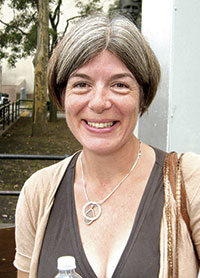
When I read in that other newspaper, The New York Times, that Somerville-based writer Claire Messud has a new book out, The Emperor’s Children (Knopf), I was like a dog on a meat truck. I was hungry for an interview. Messud’s book made number five on the New York Times hardcover fiction list. I emailed her and she graciously agreed to answer a few questions I threw her way.
The Emperor’s Children, is about three Brown University post-grads, and their attempts to make it in New York City. 9/11 hangs ominously in the background, but Messud doesn’t define it as a 9/11 novel. Her recent and past work has been favorably reviewed in many prominent publications. Messud is just one of the many fine writers that live, write and thrive in Somerville’s rich literary soil.

Claire Messud.
Doug Holder: Did it come as a complete surprise that your book would garner a lead review in the New York Times Book Review, and in general that it would get this much attention?
Claire Messud:The New York Times Book Review was a great and wonderful surprise. In the past, I’ve written novels that have been well reviewed, but somewhere deep inside the newspaper, and I expected nothing different this time. In my wildest dreams, I could not have anticipated the lovely reviews and attention the book has received. I feel very fortunate indeed.
DH: From what I have been reading about your book the characters seem rather self-absorbed. 9/11 is viewed as “How does this affect me?” Do you view your characters sympathetically?
CM: My characters are like family to me. After all, I’ve lived with them for years! I’ve always liked what Chekhov said, “It’s not my job to tell you whether horse thieves are bad people. It’s my job to tell you what horse thieves are like.” I have great sympathy – even love – for my characters, who seem to me no better or worse than most people. They’re self-absorbed, and limited, and self-indulgent, but they have positive qualities, too. I don’t believe in idealizing characters, anymore than I believe in pretending that real people are perfect. None of us is without flaws.
DH: Do you think we have developed a genre of “Post 9/11” fiction?”
CM: Gosh. I don’t know what that would mean. I do think that every fiction writer who is writing contemporary fiction has to take our times into consideration, and this means that 9/11 will be lurking there somewhere, however obliquely. Even if you set a novel on a fishing boat in Alaska, at least someone on that boat – and probably everyone – will have been changed, however subtly, by the global events of the past years. You can’t escape it, unless you write historical fiction, or perhaps science fiction.
DH: How do you like living in Somerville? How is it for a writer? Why did you choose to live here?
CM: We moved here in 2003, from Washington DC, and we love it. It’s a vibrant, complex, interesting place. I love its diversity, and I love our neighborhood. On our block, there are people who were born in their houses and who know Somerville, past and present, intimately; and there are people, like ourselves, who are relative newcomers. Everybody gets along. I love that it’s a place in which you know your neighbors, and kids play in the street, and everyone has an interesting story to tell. As a writer, you can’t ask for more than that.
DH: And how about advice for our aspiring young writers out there.
CM: A tall order! I think the best advice I can give is to stick with it. If you love to write, you’ll find a way to do it. That said, it’s important to live life, too: I think it’s wrong to think there’s only one way to become a writer. You don’t have to go to a writing program, and hide away from the wider world, although that can work for some people. If you really want to write, you’ll make the time somehow. But it helps to find a community of other writers – whether through a writing group, or by taking classes, or just by finding like-minded people to have coffee or dinner with. Writing can be a lonely business, otherwise.















Reader Comments